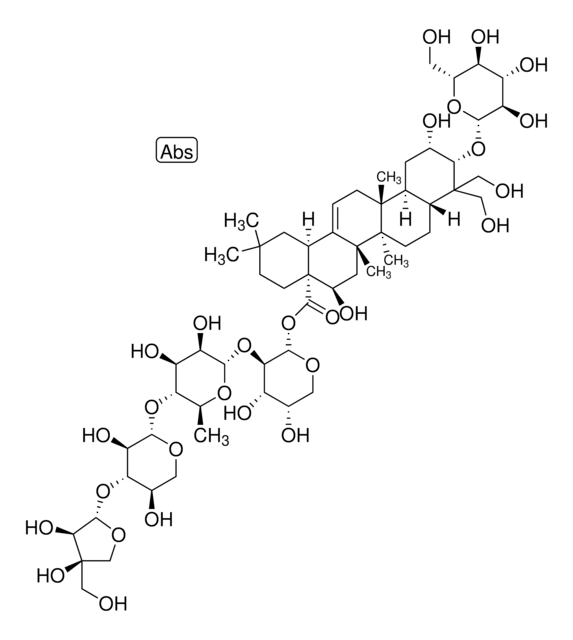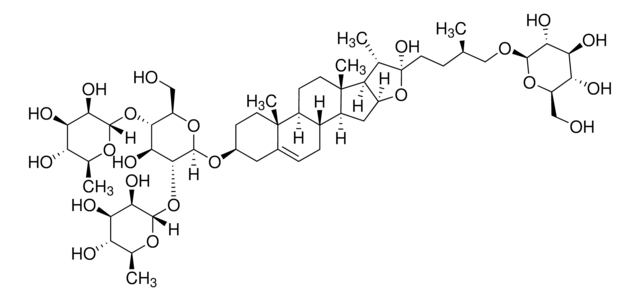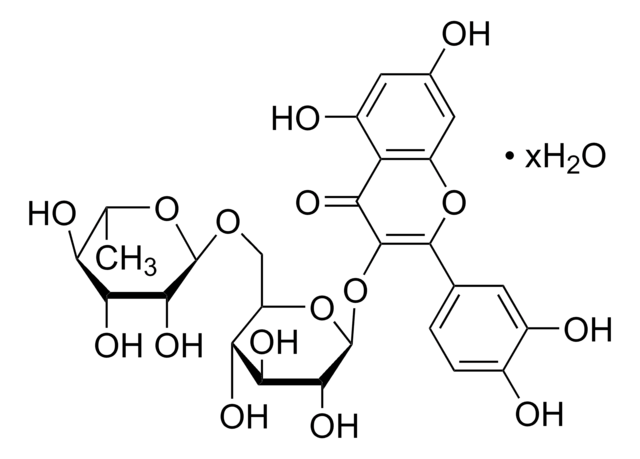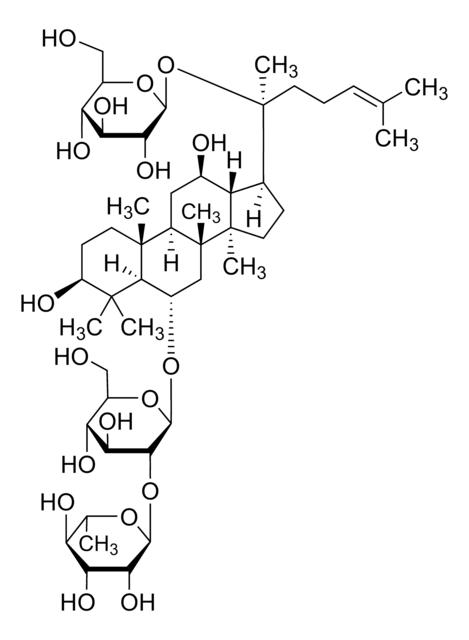SMB00424
Platycodin D
≥98% (HPLC)
Synonym(s):
3β-(β-D-glucopyranosyloxy)-2β,16α,23,24-tetrahydroxy-O-D-apio-β-D-furanosyl-(1→3)-O-β-D-xylopyranosyl-(1→4)-O-6-deoxy-olean-12-en-28-oic acid
About This Item
Recommended Products
Quality Level
Assay
≥98% (HPLC)
form
powder
application(s)
metabolomics
vitamins, nutraceuticals, and natural products
storage temp.
2-8°C
SMILES string
O[C@@H]1[C@H](O[C@H]2[C@H](O)[C@@H](O)[C@H](O)[C@@H](CO)O2)C(CO)(CO)[C@]3([H])CC[C@@]4(C)[C@]5(C)C[C@@H](O)[C@@]6(C(O[C@H]7[C@H](O[C@@H]8O[C@@H](C)[C@H](O[C@H]9[C@H](O)[C@@H](O[C@@H]%10OC[C@@](CO)(O)[C@H]%10O)[C@H](O)CO9)[C@@H](O)[C@H]8O)[C@@H](O)[C@@H](O
InChI
1S/C57H92O28/c1-23-40(81-45-39(72)41(30(64)18-76-45)82-49-43(73)56(75,21-61)22-78-49)36(69)38(71)46(79-23)83-42-33(66)29(63)17-77-48(42)85-50(74)57-12-11-51(2,3)14-27(57)24-7-9-52(4)26-13-28(62)44(84-47-37(70)35(68)34(67)31(16-58)80-47)55(19-59,20-60)25(26)8-10-54(52,6)53(24,5)15-32(57)65/h7,23,25-49,58-73,75H,8-22H2,1-6H3/t23-,25+,26-,27-,28-,29-,30+,31+,32+,33-,34+,35-,36-,37+,38+,39+,40-,41-,42+,43-,44-,45-,46-,47-,48?,49-,52+,53+,54+,56+,57+/m0/s1
InChI key
RJDYKSRQTBCKLC-XTIQGCOGSA-N
Looking for similar products? Visit Product Comparison Guide
General description
Application
- to test its anti-inflammatory and inhibitory effect on eosinophilic airway inflammation and T-helper type 2 (Th2) signaling pathways using ovalbumin (OVA)-induced allergic asthma mouse model
- to test its anti-obese effects on the activation of brown adipose tissue featuring in vivo and in vitro studies
- to test its efficacy as an adjuvant with infectious bronchitis (IB) vaccine in chicken
Biochem/physiol Actions
Signal Word
Warning
Hazard Statements
Precautionary Statements
Hazard Classifications
Acute Tox. 4 Oral
Storage Class Code
11 - Combustible Solids
WGK
WGK 3
Flash Point(F)
Not applicable
Flash Point(C)
Not applicable
Choose from one of the most recent versions:
Already Own This Product?
Find documentation for the products that you have recently purchased in the Document Library.
Our team of scientists has experience in all areas of research including Life Science, Material Science, Chemical Synthesis, Chromatography, Analytical and many others.
Contact Technical Service







